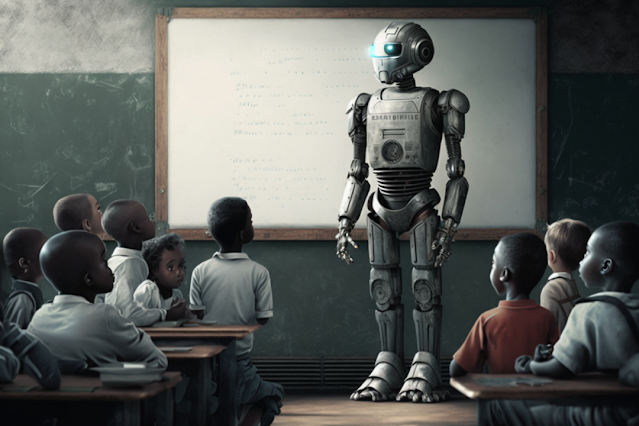In the ever-evolving landscape of education, one concept has been making significant waves: The Artificial Intelligence (AI) teacher. Imagine having a teacher who knows your unique learning style, adapts lessons to your pace, and is available 24/7 to answer your questions. AI teachers are poised to do just that and more, ushering in a new era of education.
The
Rise of AI in Education
The
AI-Powered Classroom
 |
| A diverse classroom of students engaged with an AI-powered virtual teacher on a digital screen. |
Traditional classrooms are gradually transforming into
AI-powered hubs of learning. With the help of AI, teachers can offer
individualized attention to students, addressing their specific needs. This not
only enhances the learning experience but also helps struggling students catch
up and advanced learners excel.
Read More: AI in
Education: A Love Story of Transforming Lives and Futures
Personalized
Learning at Its Best
 |
| A graph illustrating personalized learning progress with an AI teacher, with performance steadily increasing. |
One of the standout features of AI teachers is their
ability to personalize learning. They analyze a student's strengths and
weaknesses, creating customized lesson plans and suggesting supplementary
materials. This ensures that no student is left behind, fostering a more
inclusive educational environment.
The
Benefits of AI Teachers
1.
Accessibility for All
 |
| A student in a remote area uses a tablet to access education through AI, highlighting accessibility. |
AI teachers break down geographical barriers. They can
reach students in remote areas where qualified human teachers might be scarce.
This opens up opportunities for education in underserved communities, ensuring
that education is accessible to all.
2.
Enhanced Learning Experience
AI teachers never tire, ensuring that students can access
lessons and support whenever they need it. This flexibility allows students to
learn at their own pace and on their own schedule, leading to a deeper
understanding of the material.
3.
Data-Driven Insights
AI teachers collect data on student performance, providing
invaluable insights to both students and their human counterparts. Teachers can
use this data to tailor their teaching strategies, and students can track their
progress and make improvements accordingly.
4.
Adaptability
AI teachers can adapt to changing circumstances, such as a
sudden shift to online learning during a crisis. They can maintain continuity
in education and help students adjust to new environments seamlessly.
Challenges
and Concerns
1.
Lack of Human Interaction
While AI teachers offer personalized learning experiences,
they can't fully replace the human touch. The emotional connection and
mentorship provided by human educators are essential for holistic development.
Read More: Revolutionizing
Learning: How AI in Education Is Changing the Game
2.
Data Privacy
Collecting and using student data can raise concerns about
privacy. Safeguarding this information and using it ethically is a critical
challenge in AI education.
3.
Technology Barriers
Not all students have access to the necessary technology
for AI-based education. Addressing this digital divide is crucial to ensure
equitable access to AI teachers.
The
Future of Education
As technology continues to advance, AI teachers will become
even more integrated into the education system. However, they should be seen as
tools to augment, not replace, human educators. The blend of AI and human
expertise has the potential to revolutionize education, offering the best of
both worlds.
1.
EdSurge - How AI is Transforming Education
2.
The Guardian - How Artificial Intelligence is Changing Teaching
3.
MIT Technology Review - AI Is Reinventing the Way We Learn
The rise of AI teachers is reshaping education as we know
it. These AI-powered educators bring personalized learning, accessibility, and
adaptability to the forefront of education. While challenges remain, the
potential benefits are immense. As we move forward, it's crucial to strike a
balance between AI and human educators to provide the best possible learning
experience for all students. The future of education is undoubtedly a blend of
the technological prowess of AI and the human touch of dedicated educators.
What is an artificial intelligence teacher?
In the ever-evolving landscape of education, technology has emerged as a powerful ally in transforming the way students learn and teachers instruct. Among the remarkable advancements, the utilization of artificial intelligence (AI) teachers has garnered significant attention, particularly in the context of game-based literacy learning. In this article, we delve into the theories and evidence-based tools surrounding the application of AI teachers in facilitating game-based literacy learning, shedding light on how these innovative educational companions are reshaping the educational sphere.
How does AI personalize learning for students?
AI can personalize learning for students in several ways, leveraging technology to cater to individual needs, preferences, and learning styles.
What are the benefits of using AI in education?
The use of AI in education offers a wide range of benefits, transforming traditional teaching and learning methods.
Are there any challenges associated with AI teachers?
Yes, there are several challenges associated with AI teachers or AI-driven educational systems. Some of the challenges include ethical, social, and technical issues, such as privacy, security, accountability, transparency, quality, reliability, and accessibility.
How can AI make education accessible to all?
Yes, there are several challenges associated with AI teachers, including concerns about job displacement for human educators, ethical considerations regarding data privacy and bias, and limitations in AI's ability to provide emotional and interpersonal support to students.


![How to Add a Back to Top Button in Blogger [Special]](https://blogger.googleusercontent.com/img/b/R29vZ2xl/AVvXsEj0WQs0ZGgIjAoNLYkxZn2jJWPmd3ypPmf5oIXi1TXgw9_7fEh-Ocv0oGRkBgxXTBFbFCWW1LwXOuejU8dhDZ0NR0rZT4X0Fks4Tv-pdf8WPoUKAn6hv_e7tkP9bb2XYvSjVt73bGHnPb-ynhO5vMKfhLZKaKMm9wVUUOdrd7jr89UZzrPx2rC2ObxhdA/w72-h72-p-k-no-nu/Untitled.png)


0 Comments